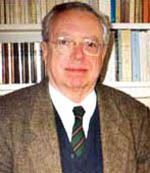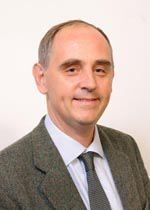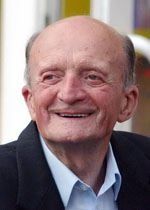“I WAS ASTOUNDED BY THE SOVIETIZATION OF UKRAINE UNDER YANUKOVYCH’S PRESIDENCY”
Alain BESANCON, Academic, Member of the French Academy of Sciences:
“Firstly, Russia will never let Ukraine go and will always try to reintegrate it into the Russian empire. And if Russia manages to do so, then it will surely be a new Russian empire. As it was very clearly stated by Zbigniew Brzezinski, domination over Ukraine is important for Russia. And if it succeeds, it will be the end of hope for Russia’s democratic evolution. Because in order to maintain the empire, Russia will have to maintain the regime that currently exists in that country.
“Secondly, I always regret that the Ukrainian borders are somewhat stretched out. I mean that it would be better for Ukraine, if its borders embraced a clear majority of European-oriented Ukrainians; that is predominantly the west of Ukraine, on the right bank of the Dnipro, and then there would be no such 50:50 split, which becomes apparent during the elections and each time is dangerous.
“Thirdly, I was astounded by the Sovietization of Ukraine under Yanukovych’s presidency. As far as I know, he has very quickly imposed his laws and his will on Ukrainians. The weak reaction of the Ukrainian people somewhat astounded me. I was no less astounded by the fact that the city of Odesa, which is reckoned an international city and belongs to Europe, voted for Yanukovych. I do not understand this.
“Fourthly, there is the Crimean problem. It is well known that the genuine indigenous population of that peninsula were the Tatars, who were extirpated and deported many times. Initially it was done by the Russian regime, and then by the Soviet one. A solution for Ukraine would be to make full restitution of the rights of Tatars. But, as we know, in the Soviet times there was a mass migration of Russians to the Crimea. Therefore I do not see a real solution to this problem, which will always be the Achilles’ heel of Ukraine — especially regarding the city of Sevastopol.
“I am very much astonished by the difference in the number of Ukrainians supporting the accession of Ukraine to the EU and to the NATO (70 percent and 30 percent). It is really confusing for me.
“In my opinion, a very important factor is (correct me, if I am wrong) the independence of the Ukrainian Church. I cannot accept that 70 percent of Ukrainian parishes belong to the Orthodox Church, which is subordinated to the Patriarch of Moscow.
“And until there is a fully independent Autocephalous Church, Russia will maintain its presence in Ukraine and deny its independence. Therefore I believe that in order to strengthen the independence of Ukraine it is important to establish the Autocephalous Ukrainian Church under its own Patriarch. And it is very painful, I believe, that money of Ukrainian congregations constitutes a very important part of the income of the Russian Orthodox Church.
“In order to speak of acceptance of European standards by the Ukrainian authorities, you need to withstand the Russian diplomacy, which is very active, and especially the diplomacy of the Moscow Patriarchate, which is currently a part of the state and an instrument of the Russian Federal Security Service, a successor to the KGB.
“I believe that presently Poland is the only European country that supports the full independence of Ukraine. Not Germany and not France, the two most influential countries of the EU. I feel ashamed that President Jacques Chirac once said in a conversation with President George Bush that Ukraine was a part of Russia. It is a sign of servility towards Russia.”
“WE HAVE 20 YEARS OF HALF-MEASURES TAKEN BY THE EU, WHICH DEMORALIZED THE PRO-EUROPE CAMP”
Edward LUCAS, International Editor at the British magazine The Economist, author of the book The New Cold War: Putin’s Russia and a Threat to the West:
“I believe that the point is not the democracy or the lack of it. The point is that business (big money) is merged with politics, which creates pressure on a system that is governed by business interests. That’s where the problem starts, and it is not specific to Ukraine, but common for any democratic country. In Ukraine this problem becomes apparent in that the business takes mass media and other state institutions under control. All this causes serious anxiety among such countries as the US and the West in general. We can also see pressure on independent public institutions. The Minister of Education is trying to crack down on independent universities.
“I believe that the introduction of a governing model in which monopolies overlap (in particular, there is no pure monopoly of political power, monopoly of the press or monopoly of economic power), is very bad for a country as a whole and, on the other hand, is very beneficial for the people who rule it. And the manipulation of power is very harmful for the country, because you lose diversity, competitiveness and pluralism, which are important for a free society. Ukraine was a free country, and currently its rating is falling, but I hope that will not last.
“I do not believe that in the case of Ukraine it is ideology that motivates the new management to move the country towards Russia. In my opinion it rather concerns Russia, which is dominated by ideology that may be called the “supreme power,” i.e. the idea that Russia is a great power and therefore should behave accordingly. I am not quite sure, but I guess it to be a kind of a pretext to conceal the greed and corruption.
“I believe that it concerns Ukraine to a lesser extent. I do not see Viktor Yanukovych threatening neighboring countries or trying to resort to Ukrainian chauvinism. In this sense there is a difference between Ukraine and Russia. Therefore I do not believe that ideology matters here. The point is the greed and desire to keep the power in their hands.
“As far as the EU is concerned, Brussels should take upon itself much blame for not having been able, over the last 20 years, to make a proposal that would be trustworthy with regard to Ukraine. We have 20 years of exercises and half-measures taken by the EU, which have demoralized the pro-European camp. Therefore it has become easier for people from the other camp to declare that the pro-European choice was hopeless. I would like to see a radical change of European policy concerning Ukraine in everything, starting from visas and ending with higher education etc. It is quite difficult at present, because the previous Ukrainian authorities have been very actively conducting negotiations with the EU, but have lost the chance to complete them, and now Brussels has to deal with a government which is less inclined to the European choice. Europe can do a lot both at the intergovernmental level and at the level of personal contacts. And we do need to do it.
“It is important, among others, for civil society to understand that despite a very disappointing behavior of the ‘orange’ politicians over the last five years, political freedom is worth fighting for. Even if you do not have politicians you can vote for, nonetheless you should have civil society, which has a great role to play in the struggle against cynicism and disappointment — in order to avoid falling a prey to those who want to make the Ukrainian political system similar to the Russian one.
“It has to be obvious for all Russia-watchers that Putin’s era has been an awful failure. In the ten years during which he has had unrestricted power and unlimited resources, he has not succeeded in modernizing Russia. Where are the new roads, new power plants, new universities, new hospitals, anything that is new? It is very difficult to imagine Russia as an economically successful country. The only visible trend is that the Russian elite is becoming very rich, which would be impossible in a real competitive society.
“Indeed, if the interests of the Ukrainian business elite lie in the direction of Russia, those of Ukrainian society lie in the totally different direction of avoiding such a model.
“Although European Commissioner Fule is a remarkable politician, unfortunately, I do not believe that he alone can exert pressure on the Ukrainian authorities. As I already mentioned, the EU needs to radically change its position toward a more open and positive attitude, so that not so much the government as average Ukrainians would feel a part of Europe, work and study in Europe, travel to Europe. Therefore, in my opinion, visits of European politicians to Ukraine and the sending of messages is not enough; the European Union should change its approach and demonstrate an understanding of how important Ukraine is for the entire continent.
“As far as the current leadership in the EU is concerned, I am not very impressed by the actions of Baroness Ashton who, in my opinion, does not contribute to successes of the European Community in foreign policy. And the best example of this is a failure to achieve a common position with regard to Belarus. The Belarussian regime behaves brutally, and therefore the EU should have to very quickly and vigorously react to its actions. Since it has not happened, then how can we cope with significantly more difficult and long-lasting problems as, for instance, in the case of Ukraine? The only thing that gives me optimism is that Germany is trying to play an ever more constructive role. The German-Polish-Swedish-Czech alliance is gaining more weight in the EU as a union of economically successful and politically determined countries. In view of this fact I am expecting progress in the European Union.”
“WE WANTED TO BE UKRAINIANS IN THE UKRAINIAN STATE”
Yevhen HRYTSIAK, leader of the Norilsk Uprising of 1953:
“Our generation was very self-sacrificing. At that time, nobody was thinking of his own life. For us Ukraine was above all. Today, unfortunately, it is not so. Some people even grudge giving one hryvnia for the benefit of the community; what self-sacrifice can we speak of at all? Not to mention the readiness to die for Ukraine. In our days we were going toward our aim — we were eager to unite with Eastern Ukraine, with Greater Ukraine, as we said then. All our thoughts were aimed at that, so that we would finally become a state. This gave us inspiration. We wanted to be Ukrainians in the Ukrainian State.
“Much later, after the Norilsk Uprising [of 1953], in 1959, I was faced with a choice: either I collaborate with the KGB, or go back to jail (the old stretch of 25 years was resumed). I chose jail. And I do not regret it even today. They told me: ‘You have acquaintances among German and Japanese officers. We need you.’ I was put in such conditions that I would have no way out. But there is always a way out — to die. And nobody will do anything to me. If a man sticks to this direction, he will achieve a lot.
“It is a great pity that, having an independent state today, we let it get out of hand. Take for instance the double citizenship on the Crimea or the Tuzla conflict that all of us remember well. The aim of Russia is as follows: first to seize the Crimea, then the Donbas, and afterwards the rest of Ukraine. And what is happening in Russia itself? Everything that is Ukrainian is suppressed there. I give you just one example. Once I was traveling to Karaganda, on the ‘Moscow-Karaganda’ train. My seat was on the upper berth at the lateral passage, and the lower one was occupied by some passenger lying covered up to his head. An elderly man (I recognized at once that he was a former state-convict) got on board with a small boy of six or seven. He was so sturdy (and obviously had suffered a lot); he sat down on his berth, and his son spoke to him [in Ukrainian]: ‘Daddy, daddy, look — there’s a radio here!’ And the one who lay covered up to his head suddenly jumped up from his seat and shouted: ‘Why are you crippling the child? He should be taught to speak pure Russian right from the start!’ That is even father and his child were not allowed to speak their native language. I know quite a lot of such cases, both in the army and in private life... Russia is doing everything to russify us. Not only because it wants to seize us, but because it feels deficient without us.
“There is another example. The engineer Orlov from the Donbas, who is of Russian descent, once told me what the future structure of Russia should be. But I understood from his story that there would be no place for Ukraine there. I asked him: ‘And what is your attitude to the separation of Ukraine from Russia?’ He nearly hit the ceiling: ‘What? Think what you’re taking about! Russia without Ukraine — it is not Russia.’ And I said: ‘Your things look bad, because we do not believe that Ukraine without Russia is not Ukraine. Rather the contrary.’ So that is their disposition, and we need to struggle against it. I was very much inspired by an article of Aleksei Shiropaev, a Russian publicist, in The Day (The Day, No. 232-233 of December 17, 2010), who recognizes that Ukrainians and Russians are different peoples, and that there was the Great Famine. In general, he is looking at Ukraine quite differently, not like most Russians. Such buds of perception of our history by Russians need to be supported.
“We need to struggle at each step. Never lose heart and do not believe that Russia is almighty.”
The Day’s FACT FILE
Yevhen Hrytsiak has been a member of a Ukrainian nationalistic youth organization in Sniatyn (Ivano-Frankivsk oblast, Ukraine), Red Army soldier, political prisoner, organizer of the Norilsk Uprising, follower of Indian philosophy, Ukrainian yogi, and victim of the KGB’s oppression. Such is the life of this extraordinary person in one sentence. He was born in 1926 in the village of Stetseva near Sniatyn. Before the World War II he studied at the Sniatyn lyceum, and during the Nazi occupation he attended the secondary school of commerce. It was in those years that he started to cooperate with a Ukrainian nationalist youth organization, which trained young people for the struggle against the occupants. As the Red Army advanced, he was mobilized to fight on the 4th Ukrainian Front, was wounded several times, and was decorated with medals for distinguished service in battle. But in 1949 his past (cooperation with a nationalist youth organization) was “revealed”: he was arrested and sentenced to death, a penalty replaced by 25 years’ imprisonment. Having been brought to despair by the inhuman conditions of life, hard labor, sadistic humiliation and deadly violence committed by the camp’s management, the prisoners of Gorlag (Norilsk special camp for “especially dangerous criminals”) rose in rebellion and required not only mitigation of the camp’s regime, but also laid down political demands for a general democratization of the Soviet regime. The uprising was quelled. For his leading role in the Norilsk Uprising Yevhen Hrytsiak had to pay with long years of confinement in the most dreadful prisons and camps of the GULAG. Only the 20th congress of the CPSU brought him freedom. But his ordeals were not over. In 1959 the Presidium of the USSR Supreme Soviet overruled the decision of its commission, by virtue of which Hrytsiak had been released in 1956, motivating it by the “gravity of his crime,” and thus resuming his 25-years’ sentence passed in 1949. Yevhen Hrytsiak was freed, if the word can be used in such a case, only in 1964. It is this wonderful person who was the first to tell people the truth about the Norilsk Uprising — in 1977, when Hrytsiak met a reporter of the American newspaper The Chicago Tribune and granted him an interview. Later on, in 1980, the Smoloskyp publishing house brought out a book of Yevhen Hrytsiak’s memoirs, which naturally caused a new wave of harsh persecution of the author by the KGB. He was threatened with an immediate long-term arrest in the event of his refusal to emigrate from Ukraine, but the steadfast Ukrainian held out.
On May 15, 2009, Den [No. 79] published an article of Igor Chubais, a well-known Russian historian, titled “Who ruined Stalinism,” in which he mentioned Yevhen Hrytsiak as one of the leaders of the Norilsk Uprising of 1953, now living in the vicinity of Ivano-Frankivsk. The role of this person in the history of not only Ukraine, but of the entire world, is colossal. It was the Norilsk Uprising that determined the tone of the 20th congress of the CPSU in many respects. Unfortunately, Ukrainians either do not know anything, or have only heard a little, about their outstanding compatriot... We contacted Yevhen Hrytsiak, and during The Days of Den/The Day in Ivano-Frankivsk Larysa Ivshyna met him personally. A man of an extraordinary strength of mind and profound wisdom, Yevhen Hrytsiak impressed our readers a lot. On the Independence Day, by virtue of the Decree of the President of Ukraine Viktor Yushchenko, Yevhen Hrytsiak was decorated with the Order of Courage of the 1st degree. So in 2009, in the 84th year of life of this real Hero of Ukraine, the state recognized his great deed.









